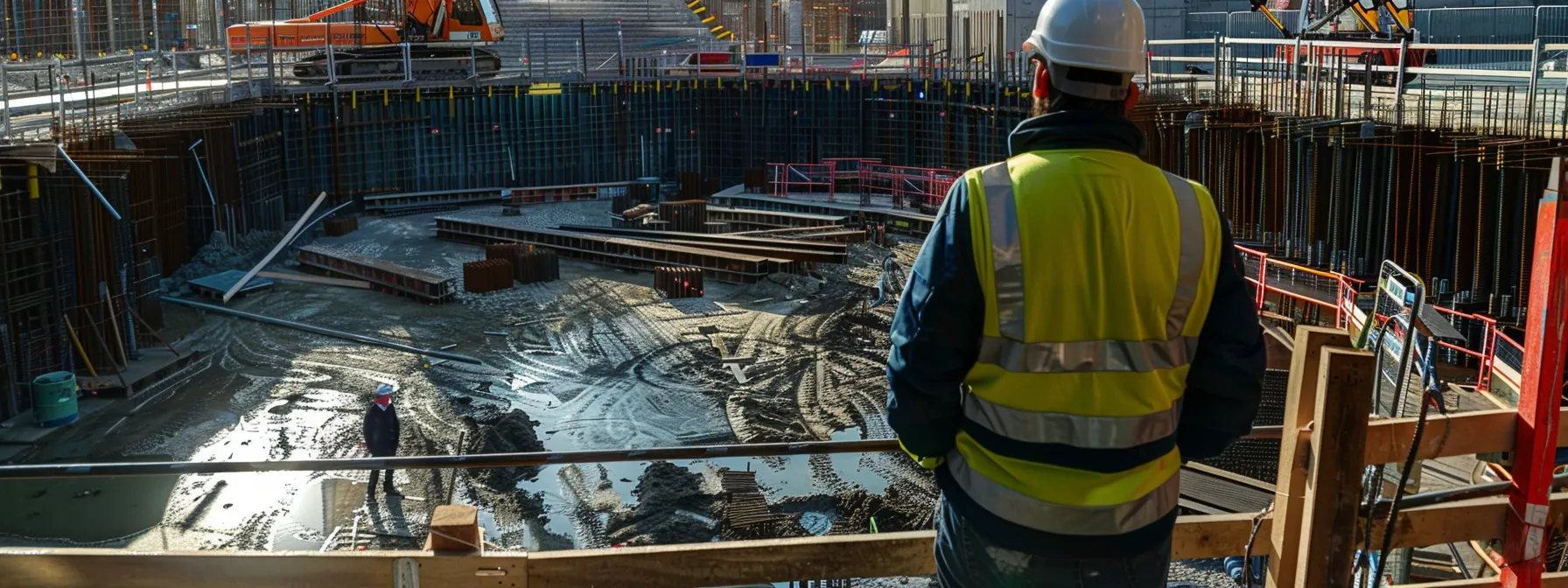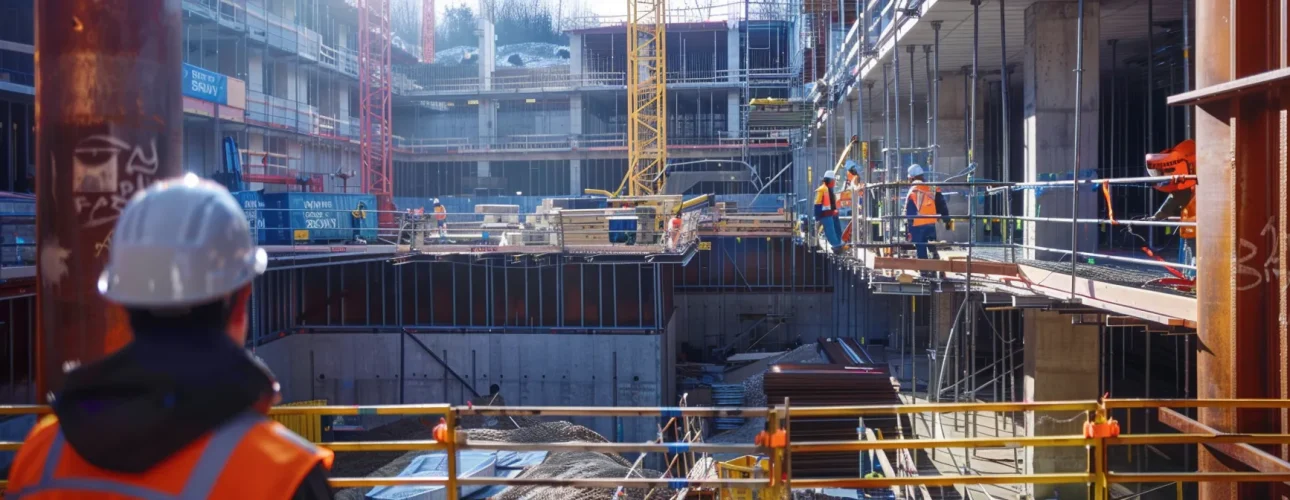Construction projects often face delays and budget overruns, impacting the quality of life in the surrounding community. By utilizing local civil engineering management services, you can enhance project management and ensure comprehensive geotechnical engineering and inspection. This article will delve into the essential services offered by local civil engineering firms, the benefits of partnering with them, and how to select the right partner for your project. You’ll gain insights to optimize your construction outcomes, ultimately saving time and resources while improving community infrastructure.
Key Takeaways
- local civil engineering services enhance project outcomes through tailored solutions and community engagement
- collaborating with local firms ensures better compliance with regional regulations and faster project approvals
- local expertise optimizes project planning, reducing risks related to environmental and logistical challenges
- effective communication and responsiveness foster collaboration, improving overall project efficiency and satisfaction
- partnering with local engineers streamlines procurement processes, reducing costs and enhancing project timelines
Understanding the Role of Local Civil Engineering Management Services

Local civil engineering management services are critical in defining project scope and ensuring quality control throughout construction. Through a deep understanding of local conditions, these services significantly impact project outcomes, such as water supply and flood management. This section will explore how local expertise influences projects, contrasting it with national providers to highlight key differences.
Defining the Scope of Civil Engineering Management
Defining the scope of civil engineering management involves clearly outlining project objectives and requirements tailored to local conditions. This process includes detailed planning for transportation engineering aspects, such as highway design, drainage systems, and traffic management. By integrating tools like building information modeling, you can visualize and manage every phase of the project, ensuring alignment with both regulatory standards and community expectations.
Local civil engineering management services emphasize strong collaboration with subcontractors and stakeholders to deliver exceptional results. Understanding local regulations and community needs is crucial, as it allows for the development of strategies that resonate with the insights provided by organizations like the American Institute of Architects. This comprehensive approach enhances project efficiency, fosters better communication, and ultimately leads to successful construction outcomes that benefit both clients and the communities in which they operate.
Impact of Local Expertise on Project Outcomes
Local expertise significantly impacts project outcomes by enabling accurate evaluation of environmental conditions and regulatory requirements. When civil engineering management services are informed by knowledge of local water resources and community dynamics, projects such as dam construction can be tailored to meet specific needs. This alignment not only ensures compliance with standards set by organizations like the Construction Management Association of America but also enhances community trust and engagement throughout the project lifecycle.
Additionally, having local experts involved in the decision-making process helps in navigating challenges that may arise, from initial planning to execution. By fostering relationships with local stakeholders, including members of the board of directors and community organizations, civil engineering management can effectively address concerns regarding resource allocation and environmental impact. This collaborative approach not only optimizes project efficiency but also leads to more sustainable construction outcomes that are beneficial for both clients and the surrounding environment.
Differences Between Local and National Service Providers
Local civil engineering management services offer distinct advantages over national providers, particularly when it comes to managing risk and understanding community needs. Local consultants are deeply familiar with regional regulations, transport logistics, and sustainability practices, allowing them to navigate projects more efficiently. This knowledge enables them to develop tailored solutions that address unique environmental engineering challenges specific to the area.
In contrast, national service providers may lack the localized insight necessary for optimizing construction projects. They often approach projects with a standardized framework that may not account for the specific environmental factors and community expectations in your region. As a result, you may face greater risks related to compliance and community engagement. By choosing local civil engineering management services, you can ensure that your project meets both regulatory requirements and community standards effectively:
- Localized knowledge of regulations and best practices
- Enhanced risk management and compliance strategies
- Improved sustainability through tailored solutions
- Stronger relationships with local stakeholders
- More efficient transport and project execution
Local civil engineering management services play a vital part in shaping communities. As you consider their impact, think about the advantages that come with partnering with local firms — the connection, the expertise, and the commitment to getting it right.
Benefits of Partnering With Local Civil Engineering Firms

Partnering with local civil engineering firms offers significant benefits for optimizing construction projects. Improved communication and responsiveness enhance collaboration among stakeholders, while in-depth knowledge of regional regulations ensures better compliance and effective risk management. Access to established local networks and resources facilitates smoother project execution, and cost efficiency through local sourcing minimizes expenses connected to materials and labor. These elements collectively contribute to more successful project outcomes.
Improved Communication and Responsiveness
Effective communication is essential in construction projects, especially when partnering with local civil engineering firms. These firms possess a deep understanding of local conditions, enabling them to relay project updates and changes promptly. By maintaining close relationships with architects and stakeholders, local managers enhance collaboration, making it easier to adapt plans to address issues related to climate change, energy efficiency, and compliance with regulations.
Responsiveness is another critical benefit of working with local engineering services. When challenges arise, having a local firm on your side means quicker problem-solving. They can promptly address unforeseen issues and adjust strategies as needed, ensuring accounting and resource allocation align with project needs. This agility not only improves project timelines but also enhances overall satisfaction for clients and community members alike.
In-Depth Knowledge of Regional Regulations
Your project benefits immensely from the in-depth knowledge of regional regulations that local civil engineering firms offer. They understand the intricacies of infrastructure regulations, procurement processes, and bonding requirements that are vital for compliance and successful project execution. This expertise enables you to navigate the often complex landscape of construction laws, reducing the risk of delays or penalties that can arise from mismanagement or oversight.
By collaborating with local engineers, you gain insights into pricing and contracting practices unique to your area. This can be particularly advantageous when working with general contractors, as localized pricing intelligence helps you secure more accurate bids and favorable contract terms. Their familiarity with the local regulatory framework supports streamlined approval processes, empowering you to maintain project timelines while ensuring all legal aspects are addressed efficiently.
Access to Established Local Networks and Resources
Access to established local networks and resources significantly enhances your construction projects. Partnering with local civil engineering firms means tapping into their relationships with suppliers, subcontractors, and regulatory organizations. This access can streamline procurement processes for materials like concrete and facilitate faster project approvals, ultimately saving time and reducing costs during the construction phase.
Moreover, local firms often foster a culture of innovation through partnerships with educational institutions, such as universities offering a Master of Science in Structural Engineering. These connections encourage the adoption of the latest technologies and practices which can improve project efficiency and sustainability. By leveraging these established networks, you can achieve superior project outcomes and ensure that your construction projects align with local standards and community expectations:
- Streamlined procurement processes for materials.
- Faster project approvals through local relationships.
- Access to innovative technologies and practices.
- Enhanced alignment with local standards and community needs.
Cost Efficiency Through Local Sourcing
Cost efficiency is one of the primary advantages of partnering with local civil engineering firms. By sourcing materials and services from nearby suppliers, you can significantly reduce transportation costs and lead times. This becomes particularly crucial when dealing with essential infrastructure, such as sanitary sewer systems, where timely execution is vital to meet regulatory demands and community health standards. Local firms understand these regulations and can assist you in preparing accurate requests for proposals (RFPs) that reflect realistic and competitive pricing.
Moreover, local sourcing enables you to engage in effective surveying practices, ensuring that the materials and services align with your project’s specific needs. By collaborating with local specialists familiar with the conditions of the area, you can avoid common pitfalls and streamline project execution. This reduces the risk of unexpected delays related to non-compliance with regulations regarding sewage management and other essential services, ultimately leading to a more successful and cost-effective project outcome.
Working with local civil engineering firms brings clear advantages. Yet, it is their essential services that truly shape communities and projects, ensuring every detail is managed with care.
Essential Services Provided by Local Civil Engineering Management

Local civil engineering management services provide essential functions that optimize your construction projects. You will benefit from site evaluation and feasibility analysis, which assess the viability of your project from the outset. Customized project planning and design ensure that your specific needs are met, while regulatory compliance and permitting assistance help navigate necessary local laws. On-site supervision and quality assurance maintain construction standards, and risk assessment and mitigation strategies are vital for addressing potential challenges, including those related to wastewater and emergency management.
Site Evaluation and Feasibility Analysis
Site evaluation and feasibility analysis are critical processes that help you understand the potential impacts of your construction project on the surrounding landscape. By examining the physical characteristics of the land, local civil engineering management services can identify challenges such as drainage issues or unsuitable soil conditions that may affect water treatment systems. This knowledge empowers you to make informed decisions that enhance the efficiency and sustainability of your project, ensuring it aligns with community needs and regulatory requirements.
Additionally, effective feasibility analysis considers climate factors that may influence the long-term success of your project. Understanding local weather patterns and natural resource availability allows civil engineering professionals to recommend designs that incorporate recreational spaces and sustainable practices, thereby enhancing the overall quality of life for the community. By engaging in thorough site evaluations, you can mitigate risks and optimize your project’s design to achieve desired outcomes while adhering to best practices in civil engineering.
Customized Project Planning and Design
Customized project planning and design is essential for ensuring that your construction project meets specific regulatory and community requirements. By collaborating with local civil engineering management services, you gain access to designs tailored to your project’s unique context, taking into account local landscapes, infrastructure, and environmental considerations. This approach directly aligns your project with community needs and enhances its long-term sustainability.
A thorough understanding of the local context allows engineers to create optimized plans that foster efficiency and minimize risks. For example, local knowledge may inform the design of water management systems that effectively respond to regional climate patterns. Implementing such customized solutions not only drives project success but also builds community trust and engagement:
- Utilization of local environmental data to inform design decisions.
- Tailored solutions to meet specific project requirements.
- Incorporation of community feedback into the planning process.
- Adherence to local regulations and standards for compliance.
Regulatory Compliance and Permitting Assistance
Regulatory compliance and permitting assistance are fundamental components of local civil engineering management services. By partnering with local experts, you ensure that your project adheres to all relevant codes and regulations, significantly reducing the risk of delays and penalties. Their familiarity with regional laws and processes streamlines approvals, allowing your project to progress efficiently and within established timelines.
Moreover, local firms provide essential support in preparing and submitting necessary documentation, which can be complex and time-consuming. Their expertise helps you navigate the nuances of local permitting processes, delivering accurate plans that reflect compliance with environmental regulations and zoning requirements. This proactive approach not only saves valuable time but also fosters a smooth interaction with regulatory authorities, ensuring your project meets community and environmental standards:
On-Site Supervision and Quality Assurance
On-site supervision and quality assurance are integral to the success of your construction projects. Local civil engineering management professionals provide expertise that ensures compliance with design specifications, safety standards, and regulatory requirements. Their presence on-site allows for real-time monitoring, enabling prompt adjustments to mitigate any issues that arise during construction.
Engaging local engineers means having a team that is familiar with the specific challenges of your project environment. This local insight enhances the quality assurance process, as they can assess site conditions and foresee potential complications related to local climate and soil types. By implementing robust quality control measures, you can ensure that your project not only meets deadlines but also adheres to community standards and enhances overall sustainability:
Risk Assessment and Mitigation Strategies
Effective risk assessment and mitigation strategies are essential in local civil engineering management. By identifying potential risks early in the project lifecycle, local professionals can develop targeted strategies to minimize impacts related to environmental concerns, regulatory compliance, or logistical challenges. Your project benefits from their expertise, as they provide actionable insights that enhance decision-making and guide you in avoiding common pitfalls that can disrupt timelines and budgets.
Additionally, local civil engineering management services continuously monitor project conditions to adapt mitigation strategies as challenges arise. This proactive approach ensures that you remain informed and prepared for any issues that may occur, allowing for quick adjustments in resource allocation or design modifications. Engaging local experts ultimately empowers you to navigate complex projects more effectively while optimizing the overall construction process and outcomes.
Understanding the essential services offered by civil engineering management sets the foundation for your project’s success. Next, you’ll need to know how to choose the right partner to bring your vision to life.
How to Choose the Right Local Civil Engineering Partner

To choose the right local civil engineering partner, assess crucial factors that influence project success. Start by examining their experience and industry expertise, including past project successes. Verify professional licenses and certifications to ensure compliance with regulations. Understand their approach to client collaboration and consider their technological capabilities, as these elements are essential for optimizing your construction projects.
Assessing Experience and Industry Expertise
When assessing the experience and industry expertise of potential local civil engineering partners, examine their track records with past projects similar to yours. You should look for firms that have successfully executed projects in your specific region, as local knowledge plays a crucial role in navigating regulations and environmental conditions. For instance, a firm that has previously managed transportation engineering projects relevant to your area can bring valuable insights that enhance project efficiency and compliance.
Consider also the qualifications of the team’s members. Verify their professional certifications and licenses to ensure they meet the necessary industry standards. By focusing on experienced professionals with a proven history of collaboration with local stakeholders and regulatory bodies, you can feel confident in their ability to deliver optimal results for your construction projects:
- Check past project success rates.
- Evaluate experience in your specific region.
- Verify professional certifications and licenses.
- Ensure familiarity with local regulations and stakeholders.
Evaluating Past Project Successes
Evaluating past project successes is vital when selecting a local civil engineering partner. You should thoroughly review their previous work and assess if they have completed projects similar to yours in both scope and complexity. By doing so, you gain insight into their ability to navigate local regulations and address specific community needs.
In addition, consider analyzing client testimonials and case studies that highlight their achievements. These resources provide practical examples of how your potential partner has managed challenges and delivered results effectively. Focus on firms that demonstrate a strong track record of successful project management, timely delivery, and adherence to quality standards as essential criteria for making an informed decision:
Verifying Professional Licenses and Certifications
Verifying professional licenses and certifications is a crucial step in selecting a local civil engineering partner. This process ensures that the firm you choose complies with industry standards and regulations. You should check if their engineers hold the necessary licenses in your state, as this demonstrates their commitment to professionalism and ongoing education in civil engineering practices.
Additionally, certifications from recognized organizations signify that local firms have met specific competency and ethical standards. When considering a civil engineering partner, seek out those with credentials from reputable associations such as the American Society of Civil Engineers. This not only assures you of their expertise but also enhances your project’s potential for success by confirming that they are equipped to handle local challenges effectively.
Understanding Their Approach to Client Collaboration
Understanding the approach of a potential local civil engineering partner to client collaboration is crucial for optimizing your construction project. Look for firms that prioritize open communication and actively engage with you throughout the project lifecycle. A collaborative approach allows for the incorporation of your specific needs and community goals, ensuring that the engineering solutions align with project expectations and local regulations.
Additionally, a strong commitment to client collaboration means that the engineering team is not only responsive but also proactive in addressing challenges as they arise. By choosing a partner that emphasizes teamwork and transparency, you can enhance project efficiency and reduce the likelihood of misunderstandings. This leads to more effective problem-solving and helps maintain project momentum, which is essential for delivering timely and cost-effective results.
Considering Technological Capabilities
When considering technological capabilities, it’s essential to evaluate how local civil engineering firms leverage advanced tools and software in their project management. Firms that utilize building information modeling (BIM) and project management software can optimize planning and execution, ensuring that your construction projects adhere to timelines and budgets. This proficiency in technology enhances collaboration and facilitates real-time updates, allowing you to address challenges promptly and keep the project on track.
Furthermore, understanding the technological tools a firm employs can be crucial for enhancing project efficiency and sustainability. For instance, firms that incorporate data analytics into their planning processes can better predict potential risks and resource needs, aligning construction efforts with community goals. By choosing a local civil engineering partner with strong technological capabilities, you can gain a competitive advantage that directly contributes to a successful project outcome.
Choosing the right partner is just the beginning. Let’s look at some real-world examples where smart choices led to optimized construction projects.
Real-World Examples of Optimized Construction Projects

Local civil engineering management services significantly enhance construction projects across various sectors. Municipal infrastructure improvements reflect the value of incorporating local input, ensuring community needs are met. Commercial developments benefit from local management expertise, while residential projects thrive on regional insights. Public works projects are effectively streamlined through local partnerships, fostering collaboration and efficiency throughout the construction process.
Municipal Infrastructure Improvements With Local Input
Local civil engineering management services are vital in driving municipal infrastructure improvements that meet community needs. By collaborating closely with local agencies, these firms ensure that projects—such as road upgrades, water supply systems, and public transportation enhancements—are tailored to the specific requirements of the region. This localized knowledge allows you to effectively address concerns related to traffic flow, environmental impact, and sustainability, resulting in well-planned developments that benefit residents and businesses alike.
Moreover, engaging local civil engineering firms fosters stronger relationships with community stakeholders, further enhancing project success. These professionals can leverage their connections to gather input from residents and local organizations, ensuring that projects reflect the desires and expectations of the community. As a result, you can achieve greater public support and compliance, while also ensuring efficient execution that aligns with regulatory standards and mitigates challenges throughout the development process.
Commercial Developments Enhanced by Local Management
In commercial developments, local civil engineering management services play a pivotal role in optimizing project outcomes. By leveraging their in-depth understanding of regional market dynamics and regulatory landscapes, these firms can design infrastructure that aligns not only with your business needs but also with community standards. This localized approach enhances stakeholder engagement and ensures that developments provide practical solutions, addressing both functionality and aesthetic appeal.
Furthermore, local management expertise allows for swift adaptation to changing project requirements and unforeseen challenges. When local civil engineers collaborate with your team, they bring a wealth of knowledge regarding local suppliers and subcontractors, which streamlines procurement processes and reduces costs. This efficient execution minimizes delays, enhancing project timelines and ultimately leading to a more successful commercial development that meets your strategic goals.
Residential Projects Benefiting From Regional Expertise
Residential projects benefit significantly from local civil engineering expertise by ensuring that designs incorporate the unique characteristics of the area. Local engineers are well-versed in regional zoning laws, environmental considerations, and community aesthetics, enabling them to create plans that meet both regulatory requirements and homeowner expectations. By tapping into this specialized knowledge, you can enhance the appeal and functionality of residential developments, ultimately adding value to your property.
The involvement of local civil engineering management services also facilitates improved communication with community stakeholders, ensuring that residential projects align with the needs of current residents. For instance, local firms can gather input on neighborhood preferences, leading to designs that resonate with the community and foster support for new developments. This engagement helps mitigate potential conflicts while enriching the project with local insights:
Public Works Projects Streamlined Through Local Partnerships
Public works projects benefit greatly from local partnerships due to the expertise and insights they bring. When local civil engineering management services are involved, they leverage their understanding of regional infrastructure needs and community dynamics to streamline project execution. This local focus facilitates quicker decision-making, which allows for timely addressing of regulatory requirements and community concerns, ultimately enhancing project efficiency.
Moreover, collaborating with local engineers fosters strong relationships with community stakeholders, leading to increased public support for projects such as road upgrades and water supply systems. Their familiarity with local regulations ensures compliance while also adapting designs to meet community expectations. As a result, these partnerships contribute to the successful delivery of public works projects that not only fulfill essential infrastructure needs but also enhance the quality of life for residents.
In the arena of construction, innovation drives success. Now, let’s explore the new trends shaping civil engineering management in your community.
Emerging Trends in Local Civil Engineering Management

Emerging trends in local civil engineering management are shaping how you optimize construction projects. The adoption of advanced construction technologies enhances efficiency while promoting sustainable and green building practices aligns with community goals. Collaborative approaches in community development foster stakeholder engagement, and adapting to changing regulatory environments ensures compliance. Each aspect plays a critical role in achieving successful project outcomes.
Adoption of Advanced Construction Technologies
The adoption of advanced construction technologies is transforming how local civil engineering management services optimize construction projects. Utilizing tools such as Building Information Modeling (BIM) allows you to create detailed digital representations of your project, enhancing planning, coordination, and communication among stakeholders. This level of precision not only minimizes errors but also supports informed decision-making, particularly in complex projects where multiple factors must be managed simultaneously.
Moreover, integrating technologies like drones and real-time data analytics into your construction processes provides valuable insights for monitoring progress and identifying potential issues early. By leveraging these advanced tools, local firms can enhance project efficiency and ensure that construction timelines are met. This proactive use of technology ultimately leads to successful outcomes that align with community expectations and regulatory requirements, making your projects not only more efficient but also more sustainable.
Emphasis on Sustainable and Green Building Practices
Emphasizing sustainable and green building practices is an essential trend in local civil engineering management that can significantly enhance your construction projects. By integrating environmentally friendly materials and energy-efficient systems, you create structures that not only reduce the ecological footprint but also appeal to increasingly eco-conscious clients. For instance, utilizing renewable resources and innovative technologies can lower operational costs over time, making your project more attractive to investors and stakeholders.
Moreover, this focus on sustainability aligns your projects with community values, fostering goodwill and support among local residents. Collaborating with local civil engineering experts allows you to incorporate region-specific sustainability measures that address environmental concerns relevant to your area. As you prioritize these practices, you not only comply with regulations but also position your projects as responsible contributions to the community’s infrastructure and well-being.
Collaborative Approaches in Community Development
Collaborative approaches in community development are crucial to optimizing construction projects with local civil engineering management services. Engaging with community members and local organizations ensures that projects reflect the needs and values of residents. This involvement not only enhances project outcomes but also fosters trust and support, making it easier to address concerns relating to environmental impacts and infrastructure functionality.
By implementing collaborative strategies, civil engineering firms can gather valuable insights during the planning stages, allowing for the integration of community feedback into project designs. This method increases accountability and leads to sustainable solutions that prioritize both efficiency and community satisfaction. Effective collaboration also boosts stakeholder engagement, resulting in stronger partnerships and a shared commitment to the project’s success:
Adapting to Changing Regulatory Environments
Adapting to changing regulatory environments is essential for successful construction project management. Local civil engineering management services are equipped to navigate evolving local laws and industry standards, ensuring that your projects remain compliant and avoid costly delays. By staying updated on regulatory changes, local experts can help you anticipate and address potential challenges from the outset, ultimately enhancing project efficiency and reducing risks.
Moreover, engaging with local civil engineering firms fosters a proactive approach to regulatory compliance. They possess the local knowledge and relationships necessary to streamline permitting processes and facilitate effective communication with regulatory agencies. By leveraging their expertise, you can secure needed approvals swiftly, which is critical for maintaining your project timeline and meeting community expectations:
Conclusion
Optimizing construction projects with local civil engineering management services is essential for aligning projects with community needs and regulatory requirements. By leveraging local expertise, firms enhance communication, improve risk management, and ensure timely project execution, ultimately leading to more successful outcomes. Their deep understanding of regional regulations and environmental factors fosters stronger relationships with stakeholders, enhancing public support and engagement. Emphasizing local collaboration not only drives project efficiency but also contributes to sustainable development that benefits both clients and the communities they serve.





